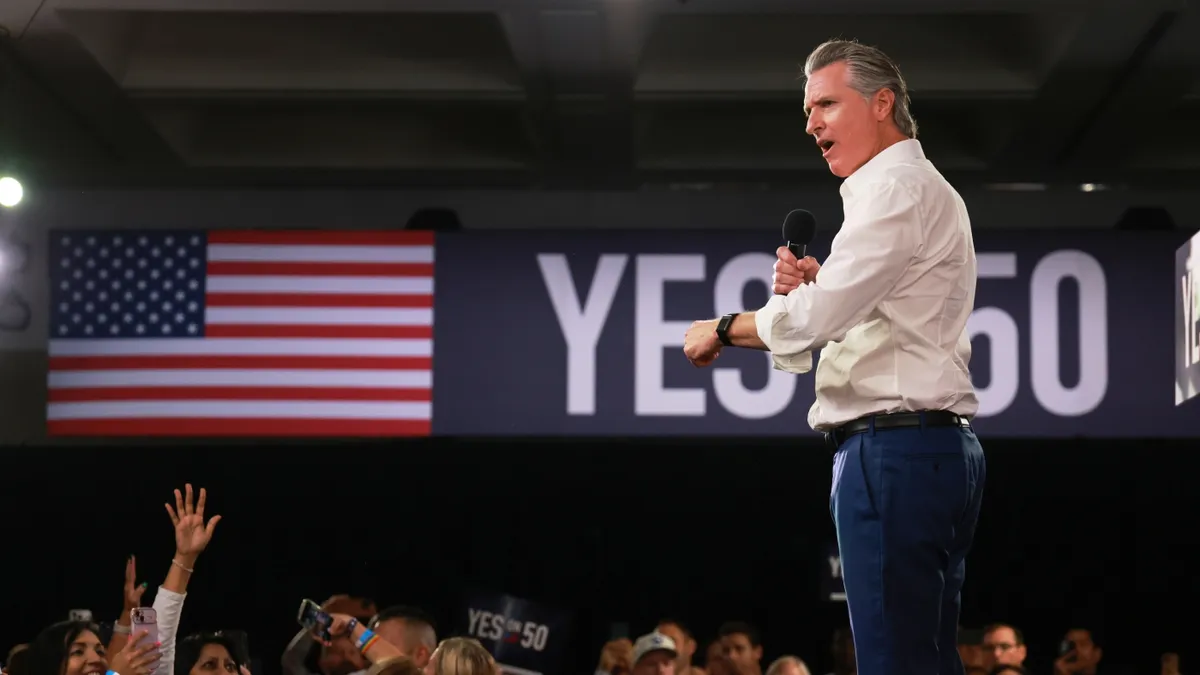
SAN FRANCISCO — In a significant turn of events, California voters have overwhelmingly approved a ballot measure designed to redraw the state’s congressional map, favoring the Democratic Party. This decision was confirmed by a race call from The Associated Press, marking a pivotal victory for Democrats in the ongoing national struggle over redistricting in the lead-up to the 2026 midterms. Known as Proposition 50, this measure will replace the congressional lines established by an independent commission with a new map that could potentially add up to five new seats for Democrats in the upcoming U.S. House elections.
The announcement from the AP coincided with the closing of polls in California, capping off a strong election night for the Democratic Party, which also celebrated significant wins in states like Virginia and New Jersey. The approval of Proposition 50 reflects a decisive shift in California's political landscape.
The successful campaign for Proposition 50 was spearheaded by Governor Gavin Newsom, who effectively communicated to voters the necessity of redrawing congressional maps to combat gerrymandering orchestrated by Republican-led states, including Texas. In states like Texas, Missouri, and North Carolina, new GOP-favored maps were enacted with legislative approval. However, in California, Newsom and his Democratic allies needed to secure voter approval for the new political boundaries, as voters had granted redistricting authority to an independent citizens commission back in 2010.
Despite the commission's enduring popularity in California, Governor Newsom successfully heightened the partisan stakes of the campaign. He argued that California could not afford to remain passive while Republicans solidified an unfair advantage through strategic redistricting ahead of crucial midterm elections that will determine control of the closely contested House of Representatives.
The election results, according to California political strategist Erica Kwiatkowski Nielsen, demonstrate a strong willingness among Californians to stand against former President Donald Trump. “The campaign effectively addressed public fears, emphasizing that while California has led in redistricting, these are not ordinary political times,” Nielsen stated.
In terms of campaign financing, Newsom's side dominated the funding battle, amassing nearly $120 million to support Proposition 50. Key contributors included the House Majority PAC, aimed at electing Democrats, and George Soros' Fund for Policy Reform. The Yes campaign inundated the state with advertisements featuring prominent Democrats, including former President Barack Obama and New York Rep. Alexandria Ocasio-Cortez.
Polling conducted in the final week of the campaign indicated robust support for the measure, with over 90% of Democrats in favor and more than 90% of Republicans opposed. This stark division foreshadowed a challenging landscape for opponents of Proposition 50, considering Democrats' substantial registration advantage in California.
The campaign against Proposition 50 was primarily led by Charles Munger Jr., a Bay Area donor who initially funded the creation of the citizens redistricting commission in 2008. Munger contributed nearly $33 million to the No on 50 campaign, which accounted for approximately three-quarters of the $44 million raised by opponents. Other prominent Republican figures largely refrained from supporting the opposition, and spending against Proposition 50 dwindled in the campaign's final weeks as polling indicated a widening lead for the measure.
Even Arnold Schwarzenegger, the former Republican governor of California who collaborated with Munger to establish the citizens commission, took a subdued stance, expressing his opposition in only a few interviews and public appearances.
The newly approved congressional map under Proposition 50 is anticipated to create a series of challenging scenarios for Republican incumbents in the coming weeks. U.S. Representatives Ken Calvert, Darrell Issa, Kevin Kiley, and Doug LaMalfa will now have to evaluate their options regarding running in districts where their chances of reelection range from difficult to nearly impossible. The changes brought about by Proposition 50 will remain in effect until the 2030 election, at which point the citizens commission will reassume redistricting responsibilities.